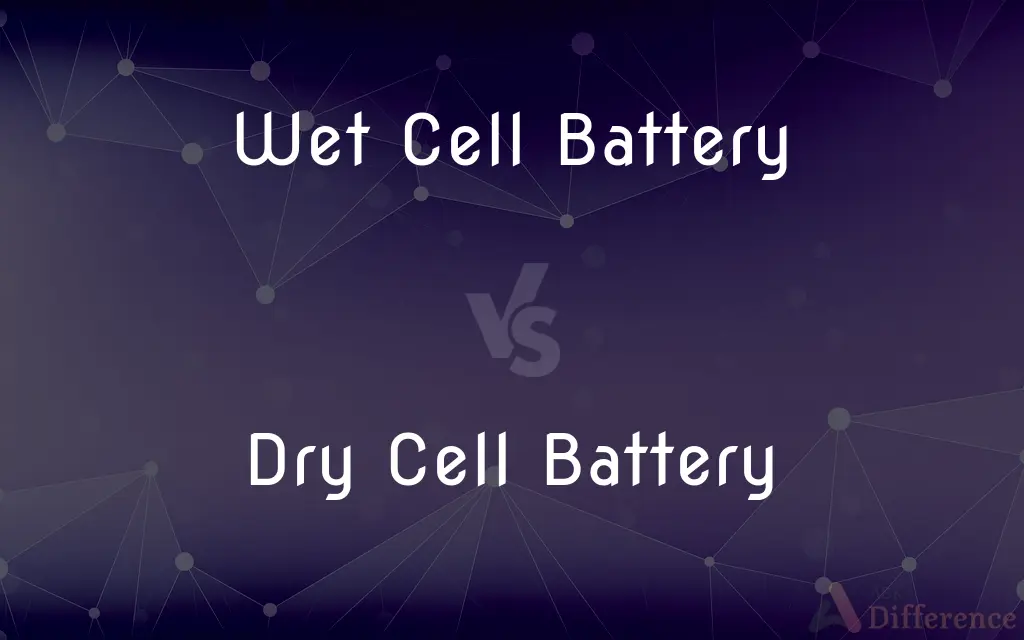Wet Cell Battery vs. Dry Cell Battery — What's the Difference?
By Tayyaba Rehman & Fiza Rafique — Published on February 3, 2024
Wet cell batteries use a liquid electrolyte and are often rechargeable, while dry cell batteries contain a paste electrolyte and are usually disposable.

Difference Between Wet Cell Battery and Dry Cell Battery
Table of Contents
ADVERTISEMENT
Key Differences
Wet cell batteries and dry cell batteries differ primarily in their electrolyte composition. Wet cell batteries use a liquid electrolyte, typically a solution of water and sulfuric acid. Dry cell batteries, on the other hand, use a paste-like electrolyte, which is less prone to spilling.
In terms of maintenance, wet cell batteries often require more upkeep, such as regular checking and refilling of the electrolyte levels. Dry cell batteries, in contrast, are maintenance-free and are used until they lose their charge, then disposed of.
Wet cell batteries are generally known for their higher power capacity and are often used in high-demand situations like in automotive batteries or backup power systems. Dry cell batteries are more commonly used in portable devices due to their compact size and convenience.
The durability and lifespan also differ; wet cell batteries can have a longer lifespan, especially when properly maintained, and are often rechargeable. Dry cell batteries usually have a shorter lifespan and are typically single-use.
Safety considerations vary as well; wet cell batteries can be more hazardous due to the possibility of acid spills and the release of hydrogen gas. Dry cell batteries are considered safer for everyday use in household devices due to their sealed nature.
ADVERTISEMENT
Comparison Chart
Electrolyte Composition
Liquid, typically a mix of water and sulfuric acid
Paste-like, non-spillable and immobile
Maintenance Requirements
Requires regular maintenance and refilling
Low to no maintenance, disposable
Typical Use Cases
Automotive batteries, backup power systems
Portable devices like flashlights, remote controls
Lifespan and Reusability
Longer lifespan, often rechargeable
Shorter lifespan, usually single-use
Safety Considerations
Potential for spills and gas emission
Generally safer and less prone to leakage
Compare with Definitions
Wet Cell Battery
Requires regular maintenance and monitoring.
He checked the wet cell battery's electrolyte levels monthly.
Dry Cell Battery
Used in a wide range of portable devices.
Most household gadgets are powered by dry cell batteries.
Wet Cell Battery
A battery using a liquid electrolyte.
The car's engine is powered by a wet cell battery.
Dry Cell Battery
Considered safer for household use.
Dry cell batteries are safer for children's toys.
Wet Cell Battery
Commonly used in automotive and industrial settings.
Forklifts in the warehouse use wet cell batteries.
Dry Cell Battery
A battery with a paste-like electrolyte.
The remote control uses a dry cell battery.
Wet Cell Battery
Can have a longer lifespan when maintained properly.
Their wet cell battery lasted for years with proper care.
Dry Cell Battery
Convenient and maintenance-free.
Dry cell batteries are preferred for their ease of use.
Wet Cell Battery
Often rechargeable, used in demanding power applications.
The wet cell battery in the UPS system provides backup power.
Dry Cell Battery
Typically single-use and disposable.
She replaced the dry cell battery in her flashlight.
Common Curiosities
Can dry cell batteries leak?
While less common, dry cell batteries can leak, especially if they are old or damaged.
How often do wet cell batteries need maintenance?
Wet cell batteries often require monthly maintenance, including electrolyte level checks.
What is the main component of a wet cell battery's electrolyte?
The electrolyte in a wet cell battery is typically a mixture of water and sulfuric acid.
Are wet cell batteries environmentally friendly?
Wet cell batteries can be environmentally hazardous due to their acid content and need proper disposal.
What makes dry cell batteries convenient?
Dry cell batteries are maintenance-free and easy to replace, making them convenient for everyday use.
What is the average lifespan of a dry cell battery?
The lifespan of a dry cell battery varies but is generally limited to the duration of its initial charge.
Can dry cell batteries be recycled?
Many types of dry cell batteries can be recycled, though it depends on the battery composition.
Are wet cell batteries used in everyday household devices?
Wet cell batteries are typically not used in everyday household devices due to their maintenance and safety requirements.
Can wet cell batteries be used for backup power systems?
Yes, wet cell batteries are often used in backup power systems due to their high power capacity.
What types of devices commonly use dry cell batteries?
Dry cell batteries are commonly used in flashlights, remote controls, and small electronic devices.
Are dry cell batteries rechargeable?
Most dry cell batteries are not rechargeable and are intended for single use.
What is the risk of using a damaged wet cell battery?
Using a damaged wet cell battery poses risks of acid leakage and harmful gas emissions.
Do dry cell batteries work well in high-drain devices?
Dry cell batteries may not be the best choice for high-drain devices as they can deplete quickly.
What should be done if a wet cell battery leaks?
In case of a wet cell battery leak, it's important to handle it with care, using protective gear and proper disposal methods.
Is it safe to store wet cell batteries at home?
Storing wet cell batteries at home requires caution due to the risk of acid spills and gas emissions.
Share Your Discovery

Previous Comparison
Estar vs. Ser
Next Comparison
Arsenal vs. ChelseaAuthor Spotlight
Written by
Tayyaba RehmanTayyaba Rehman is a distinguished writer, currently serving as a primary contributor to askdifference.com. As a researcher in semantics and etymology, Tayyaba's passion for the complexity of languages and their distinctions has found a perfect home on the platform. Tayyaba delves into the intricacies of language, distinguishing between commonly confused words and phrases, thereby providing clarity for readers worldwide.
Co-written by
Fiza RafiqueFiza Rafique is a skilled content writer at AskDifference.com, where she meticulously refines and enhances written pieces. Drawing from her vast editorial expertise, Fiza ensures clarity, accuracy, and precision in every article. Passionate about language, she continually seeks to elevate the quality of content for readers worldwide.
















































